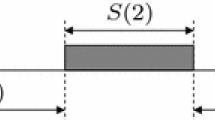Abstract
Today’s embedded systems are exposed to variations in load demand due to complex software applications, dynamic hardware platforms, and the impact of the run-time environment. When these variations are large, and efficiency is required, adaptive on-line resource managers may be deployed on the system to control its resource usage. An often neglected problem is whether these resource managers are stable, meaning that the resource usage is controlled under all possible scenarios. In this paper we develop mathematical models for real-time embedded systems and we derive conditions which, if satisfied, lead to stable systems. For the developed system models, we also determine bounds on the worst case response times of tasks. We also give an intuition of what stability means in a real-time context and we show how it can be applied for several resource managers. We also discuss how our results can be extended in various ways.













Similar content being viewed by others
Notes
Strictly speaking, V represents a load value. To obtain the accumulation of execution times, one must multiply the function with h.
In addition to this the Karush-Kuhn-Tucker matrix must be non-singular at the starting point, but it can be shown that this condition holds for any \({\overline { \rho }} \in \mathbf {P} \). See Boyd and Vandenberghe (2008) Sect. 10.2 for an in depth treatment of these conditions.
The values \(V ( \overline{x} _{[ k ]} )\) and \(V ( \overline{x} _{[ k +1 ]} )\) depend on the state of the system. If the system did not have its worst-case behavior between t [k] and t [k+1], then the drop in V(.) is higher than β.
References
Abdelzaher TF, Stankovic JA, Lu C, Zhang R, Lu Y (2003) Feedback performance control in software services—using a control-theoretic approach to achieve quality of service guarantees. IEEE Control Syst Mag 23:74–90
Boyd S, Vandenberghe L (2008) Convex optimization. Cambridge University Press, Cambridge
Bramson M (2008) Stability of queueing networks. Springer, Berlin
Buttazo GC, Albeni L (2002) Adaptive workload management through elastic scheduling. J Real-Time Syst 23:7–24
Buttazo GC, Lipari G, Albeni L (1998) Elastic task model for adaptive rate control. In: Proceedings of the IEEE real-time systems symposium, December 1998, p 286
Buttazo GC, Velasco M, Marti P, Fohler G (2004) Managing quality-of-control performance under overload conditions. In: Proceedings of the Euromicro conference on real-time systems, July 2004, pp 53–60
Cervin A, Eker J (2003) The control server: a computational model for real-time control tasks. In: Proceedings of the 15th Euromicro conference on real-time systems, July 2003
Cervin A, Eker J, Bernhardsson B, Årzén KE (2002) Feedback-feedforward scheduling of control tasks. Real-Time Syst 23:25–53
Combaz J, Fernandez JC, Sifakis J, Strus L (2008) Symbolic quality control for multimedia applications. Real-Time Syst 40:1–43
Cucinotta T, Palopoli L (2010) QoS control for pipelines of tasks using multiple resources. IEEE Trans Comput 59:416–430
Kreyszing E (1989) Introduction to functional analysis with applications. Wiley, New York
Kumar PR, Meyn S (1995) Stability of queueing networks and scheduling policies. In: IEEE trans. automatic control
Lee C, Lehoczky J, Rajkumar R, Siewiorek D (1999) On quality of service optimization with discrete QoS options. In: Proceedings of real-time technology and applications symposium, p 276
Liu CL, Layland JW (1973) Scheduling algorithms for multiprogramming in hard-real-time environment. J ACM 20(1):46–61
Liu X, Zhu X, Padala P, Wang Z, Singhal S (2007) Optimal multivariate control for differentiated services on a shared hosting platform. In: Proceedings of the conference on decision and control, December 2007, pp 3792–3799
Lu C, Stankovic JA, Son SH, Tao G (2002) Feedback control real-time scheduling: framework, modeling, and algorithms. Real-Time Syst 23:85–126
Marioni M, Buttazo GC (2007) Elastic DVS management in processors with discrete Voltage/Frequency modes. IEEE Trans Ind Inform 3:51–62
Michel AN, Hou L, Liu D (2008) Stability of dynamical systems: continuous, discontinuous, and discrete systems. Birkhäuser, Boston
Palopoli L, Cucinotta T, Marzario L, Lipari G (2009) AQuoSA – adaptive quality of service architecture. Softw Pract Exp 39:1–31
Rafiliu S, Eles P, Peng Z (2010) Low overhead dynamic QoS optimization under variable execution times. In: Proceedings of 16th IEEE embedded and real-time computing systems and applications (RTCSA), pp 293–303
Rafiliu S, Eles P, Peng Z (2011) Stability conditions of on-line resource managers for systems with execution time variations. In: Proceedings of the 23rd Euromicro conference on real-time systems
Yao J, Liu X, Yuan M, Gu Z (2008) Online adaptive utilization control for real-time embedded multiprocessor systems. In: Proceedings of the international conference on hardware/software codesign and system synthesis, pp 85–90
Author information
Authors and Affiliations
Corresponding author
Rights and permissions
About this article
Cite this article
Rafiliu, S., Eles, P. & Peng, Z. Stability of adaptive feedback-based resource managers for systems with execution time variations. Real-Time Syst 49, 367–400 (2013). https://doi.org/10.1007/s11241-013-9176-2
Published:
Issue Date:
DOI: https://doi.org/10.1007/s11241-013-9176-2




